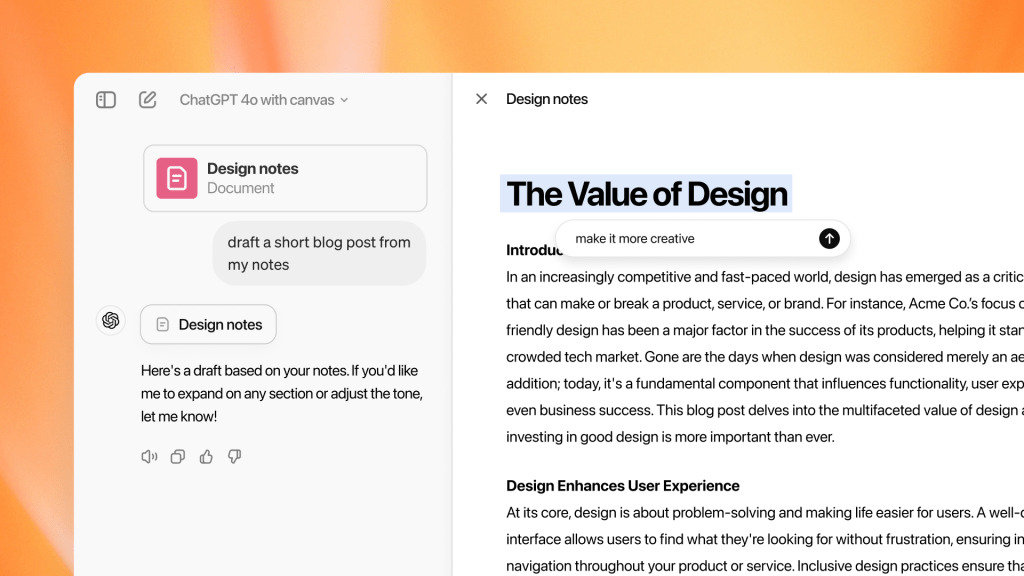
OpenAI is extending access to its side-by-side digital editing space, Canvas, to all ChatGPT users and added new features, the company announced today in a livestream, the fourth of its “12 Days of OpenAI”-holiday themed announcements.
Canvas, which was announced in October, was previously only available to paying ChatGPT Plus, Teams, Edu and Enterprise subscribers.
Available on desktop web browsers, it converts ChatGPT’s traditional interface with a conversation at the top and text entry box at the bottom into a left-hand sidebar, and on the right side of the chat session screen, adds a new space for the content the user is working on — such as a code block for an application or a text document.
When a user converses with ChatGPT and asks for changes to the content on the right sidebar, it will appear automatically there with the changes implemented, rather than generating a whole new text response in the traditional interface. Canvas can also make suggestions for text and code, which it will implement immediately.
Canvas added to GPT-4o
Starting today, Canvas will be integrated into GPT-4o, eliminating the need to toggle to GPT 4o with Canvas on the model picker. It will automatically open for some prompts or pasted text. It is available only on the web version or the Windows app of ChatGPT.
With the wider release, OpenAI also updated Canvas to run Python code, support more text pasting, and can be launched in custom GPTs.
Users can paste Python code to ChatGPT which may automatically open Canvas. Previously, it didn’t let people see if the code just generated or edited works. They needed to copy the code again and run it in their own systems. Allowing Canvas to run code brings it closer to Anthropic’s Claude Artifacts, which already allowed people to see a sample webpage from their code.
During a demo, OpenAI showed Canvas can also create and preview graphics from code alone so developers or analysts can adjust the formulas or data before finalizing a chart. Canvas also has a feature that can find bugs in the code and make suggestions to fix them.
Custom GPTs with Canvas
For those that create custom GPTs, Canvas will be integrated by default, though users can still define the parameters of when and if it will open for prompts on the assistant they created.
But for existing custom GPTs, OpenAI did not make Canvas a default to avoid disrupting how these already work. Users can add as a feature to their GPTs through the settings of the custom GPT.
Adding Canvas makes custom GPTs as powerful and useful as the base ChatGPT, allowing for more features specific to customers’ needs.
OpenAI said it plans “to continue making improvements and launching new features available in Canvas in the near term.”
Features like Canvas and Artifacts are indicative of the interface battleground model makers find themselves in as users look for more useful features to keep using the chat platforms.
Author: Emilia David
Source: Venturebeat
Reviewed By: Editorial Team



